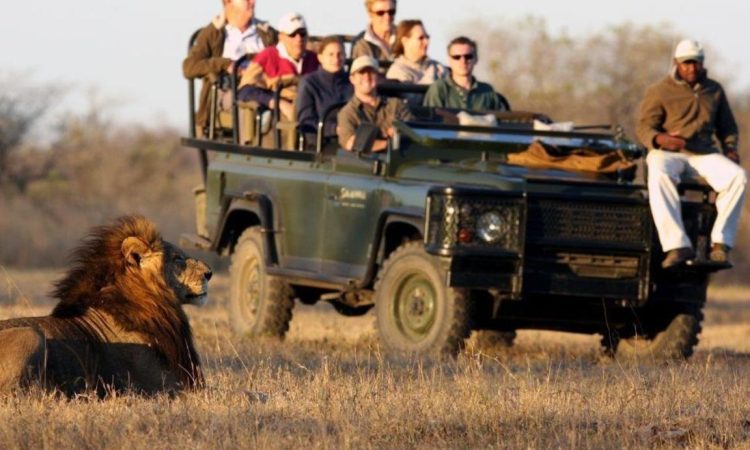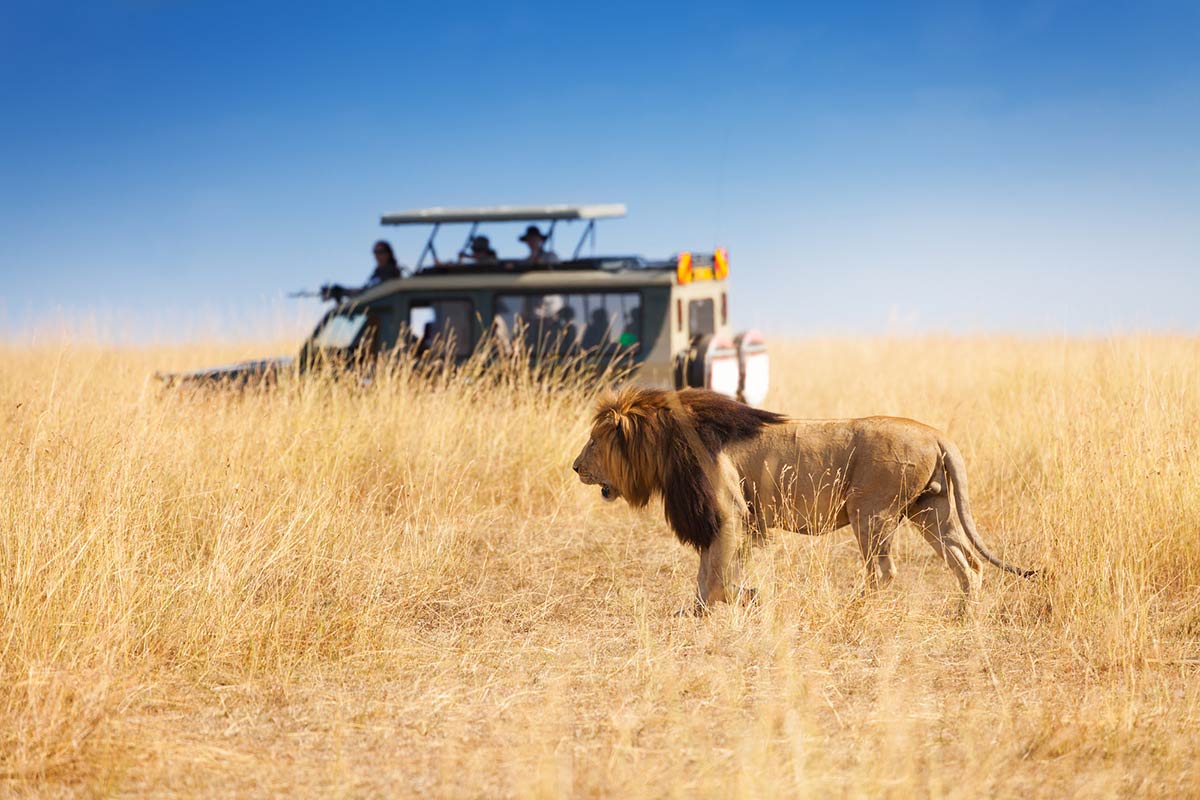Top 10 things you shouldn’t do when you’re on safari in Africa : Did you know that over 30 million tourists visit Africa yearly? Many come to see outstanding wildlife and enjoy gorgeous natural landscapes. Africa has something for everyone, from mountain gorilla trekking in Uganda’s Bwindi Impenetrable National Park and Rwanda’s Volcanoes National Park to the great wildebeest migration in Tanzania’s Serengeti National Park and Maasai Mara National Reserve to the top of Africa—Mt. Kilimanjaro and Big Five safaris in Ngorongoro Crater, to name a few. In fact, a safari in Africa is at the top of many tourists’ wish lists. However, are you aware of the dos and don’ts before going on an African safari tour? Here are the top ten things you should never do on a safari, whether it’s your first or a hundredth.

- Don’t call animals
When a stunning panorama of the African savannah comes into full view, don’t try to call or attract the attention of the animals. That entails refraining from whistle-calling at them or rapping on the expeditionary vehicle’s side. Several things could occur. First of all, loud noises could scare away the creatures you are trying to approach. Second, you might actually set off a charge in the case of large creatures like elephants.
Are you truly willing to take the chance of frightening the animals? Or putting the lives of your tour companions and guide in danger? In either case, we promise you won’t achieve your goals. Remain silent to avoid upsetting other safari-goers and your guide. If not, you risk being the trip’s least-liked traveler.
- Don’t act obnoxious.
For a safari in Africa, people pay thousands of dollars. It is an once-in-a-lifetime opportunity for certain people. Don’t be the annoying snob that blathers on all the time from their seat. They prayed for their safari money to hear the interpretation from a guide. Not you.
Stop being a chatty Cathy and start paying attention instead. You won’t be a hindrance to other tourists or your tour leader in this way. Additionally, you’ll ensure that you witness every amazing moment of your excursion. Avoid talking on the phone and talking too loudly. Don’t obstruct the view when animals appear. Don’t constantly hold your phone in the air to take videos either, as this will block your view. Finally, refrain from discussing wildlife and Africa in your commentary. Everyone dislikes a snob. Let the paid employees handle the statistics and data.
- Don’t Act Rudely to Locals
Greet people in their language when you meet them locally. The conversation can end with a simple “Hello, how are you?” But making the effort is a crucial first step in respecting regional customs. After saying that, you shouldn’t overdo it either. Don’t offer youngsters things like cash or candy, for instance. Be mindful of regional traditions and cultures.
And last, respect other people’s privacy. This implies that you should always check with your tour guide to see if it is okay to snap pictures of the individuals you encounter. Avoid acting like a paparazzi. Additionally, it signifies being polite. Avoid bombarding people with questions or requests right away, especially before giving them a decent hello. Act sincere and try to establish relationships with locals rather than strangers.
- Do Not Rely on Your Phone
Don’t spend your entire safari in Africa on your phone. Wean yourself off of texting, Twitter, and Instagram. You’ll miss significant opportunities if you don’t. They could distract others in addition to keeping you from enjoying the safari. Other people may perceive cell phones as disrespectful. Decide to unplug so you can fully appreciate your trip to Africa by being present.
- Don’t Ignore Your Guides
Your tour guide is on the clock. Avoid getting in the way by disobeying their safety instructions. Keep in mind that your guide’s responsibility includes ensuring your safety and the safety of your fellow travelers. Avoid adding to their workload. If they advise against going outside alone at night, heed their advice. Animals that hide in the African savanna have significantly better night vision than you do. Don’t make them your midnight snack by tempting them.
Additionally, don’t protrude anything from the car. Considering that you might be viewing animals that have already come into conflict with poachers, anything that resembles a gun or a hunting action raises the risk of an aggressive encounter. Stay in the car when your guide tells you to. If not, you can find yourself on the menu for the safari lunch. Likewise, don’t feed animals.

Pay attention to your guide if they instruct you to place your hands back inside the car. No matter how adorable they may seem, don’t even consider caressing any animals, as you aren’t at a petting zoo. The lives of your guide or others could be in jeopardy due to stupidity. Always listen to your guide on an African safari when it comes to how to behave and stay safe, Top 10 things you shouldn’t do when you’re on safari in Africa
- Don’t get malaria.
Did you know that around 445,000 people dies of malaria according to the World Health Organization? 91 percent of those incidents took place in Africa. Malaria, a parasitic illness, targets red blood cells. However, by taking the appropriate precautions, you can lower or even completely eliminate your risk of getting the illness. Start by doing some research. Malaria is not a threat in every region of the African continent. Investigate your trip and find out if malaria is a problem there.
Consult your doctor about taking anti-malaria medicine if the region to which you’re traveling does represent a risk for the disease. Instead of being given as a vaccination, anti-malaria drugs are prophylactics that are given as pills. However, schedule an appointment with your doctor well in advance of your vacation because they might need to be custom ordered. Many insurance providers decline to pay for preventive medicines. Consult your doctor about affordable generic options that won’t break the bank. Discuss the advantages and disadvantages of each prophylactic with your doctor because they are all different.
- Don’t Over pack
There are strict weight restrictions on the majority of flights into and out of safari camps. That implies that you must exercise judgment while you pack. Soft duffel bags perform better than hard-shell luggage in addition to requiring less packing. Pack wrinkle-resistant, unpretentious attire in neutral colors. Choose a mix-and-match, layerable wardrobe because temperatures can change. Both men and women should wear loose-fitting safari clothes, which should include shorts and slacks as well as shirts with long and short sleeves. You’ll arrive well-prepared for whatever conditions Africa may throw your way if you bring the proper safari packing list and luggage. To make the most of the space in your suitcase, think about utilizing vacuum sacks. They’ll also aid in keeping you organized.
- Don’t forget to tip.
Tipping local workers and your guide is an essential component of the Tanzania safari experience. Whether you’re in Uganda, Kenya, Rwanda, Tanzania or South Africa for a safari, find out how much is customarily left as a tip and comply. Avoid being stingy because tips could be essential to your guide’s basic income. Unsure of what and how much to tip? Rates change depending on the company and the region. Just be careful not to inquire about the right rate with individuals you need to tip. Instead, speak with your tour guide, the camp manager, or a different non-tipped worker.
- Don’t Ignore Nature
A safari in Africa takes you deep into the vast, uninhabited interior. For some people, experiencing nature up close and personal has varied meanings. It might be a profoundly spiritual experience for some people, like your guides. Don’t pollute the environment or otherwise violate the moment’s sanctity by leaving trash behind. Observe the same regulations as you would in a US national park. Avoid littering and being environmentally irresponsible. Your tour guide isn’t a paid janitor or trash hauler, after all. Show consideration for the environment. Keep in mind that you are a visitor in Africa and should act accordingly, Top 10 things you shouldn’t do when you’re on safari in Africa
- Ask No Obvious and annoying Questions
Insensitive inquiries reveal considerably more about the asker than the recipient. Leave behind any preconceived notions you may have about Africa before traveling abroad. Conduct some research to avoid asking irrelevant or unnecessary questions. Africa is a varied continent with 54 unique countries. There are 1,500 to 2,000 different languages spoken in Africa. Africa is home to some of the most intelligent and accomplished individuals on the planet. However, queries like these are still frequently asked of locals:
- What’s Africa like?
- Is your home a mud hut?
- Do you know Swahili?
- Do you walk around topless or naked?
- Do you have Internet access?
- How did you learn English?
- Do you speak African?
These inquiries reveal the ignorance of the asker. Avoid them and anything else that can be interpreted as patronizing. Remember that you are a visitor in Africa and should show the highest respect to all of your hosts.
SAFARI IN AFRICA
Like anything else in life, there are expectations associated with an African safari. Now that you are aware of the dos and don’ts, you will be ready to embark on an amazing trip. Everyone can have a more enjoyable safari in Africa with a little common decency and cultural awareness. The aforementioned advice will assist you in making the most of the experience so that your memories become priceless rather than something you’ll never forget. One of the most thrilling and rewarding experiences you will ever have is traveling to Africa.


